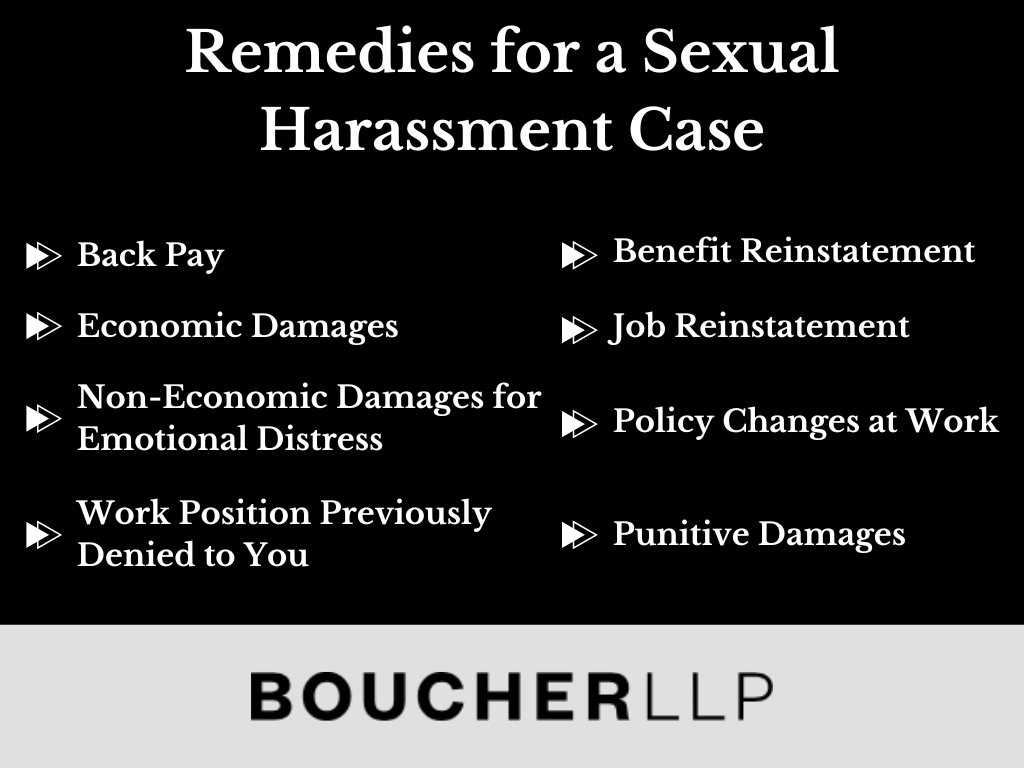
San Diego Sexual Harassment Attorney
San Diego is an amazing place to live and work. But not if you are being sexually harassed.
We firmly believe that everyone has the right to feel safe and respected, regardless of their location – be it the workplace, a place of worship, an educational institution, a union office, or any professional setting. Sexual harassment is not only morally wrong but also illegal, and no one, including you, should ever have to endure it.
If you experienced sexual harassment in San Diego and are seeking help and guidance, we encourage you to reach out to Boucher LLP’s team of experienced sexual harassment lawyers in San Diego. They are here to provide support and discuss the legal options available to you.
What Is Sexual Harassment?
Understanding what constitutes sexual harassment can be confusing. You may instinctively know that something is wrong, but may not be sure if what you experienced legally qualifies as sexual harassment. The law defines sexual harassment as requests for sexual favors, unwelcome sexual advances, or any unwanted verbal or physical contact of a sexual nature. This definition encompasses a wide range of offensive behaviors, such as:
- Displaying sexually inappropriate images,
- Making generalizations about sex or gender,
- Using sex-based slurs and insults,
- Telling offensive jokes about sex or gender,
- Making sex-based threats,
- Touching others without consent, and
- Making sexual requests or advances.
It is important to note that the legal system typically does not readily label isolated instances of inappropriate conduct as sexual harassment and initiate punitive action. Generally, an isolated occurrence is not actionable unless it results in adverse employment decisions such as termination or loss of benefits, or if the single incident of conduct is extremely severe.
In the workplace, sexual harassment becomes actionable when it unreasonably interferes with your job performance or creates an intimidating, hostile, or offensive work environment. In some cases, the harasser may also seek a quid pro quo, where they ask for sexual favors in exchange for work-related benefits or threaten negative employment consequences if you do not comply with their unwanted advances or demands.
Often, the harasser abuses their position of power, which can make it more challenging to confront them. The harasser does not necessarily have to be a superior, they can also be:
- Non-supervisor employees,
- Business affiliates,
- Contractors,
- Clients, and
- Customers.
Employers who were aware of the harassment, had control over the harasser, and failed to address the misconduct can be held liable for the sexually harassing behaviors.
Sexual harassment is not limited to specific genders; it can happen to individuals of any gender and can be perpetrated by someone of any gender. In some cases, the person being harassed may not be the one who files the complaint. If you have witnessed harassment directed at someone else and were negatively impacted by it, you may have a legal claim.
If you are considering filing a sexual harassment complaint, we strongly recommend consulting the San Diego sexual harassment attorneys at Boucher LLP. They can provide guidance on your next steps and assist you throughout the process.
What Should I Do If I Have Been Sexually Harassed At Work?
In the unfortunate event that you have experienced sexual harassment in the workplace, you deserve justice and may be entitled to compensation for the harm you endured. While we understand that it can be challenging, it is important to utilize all available internal grievance procedures and legal actions to protect your rights.
Tell Your Harasser to Stop
It is important to clearly communicate to the harasser that their behavior is unwelcome. Legal authorities tend to take action against sex-based behaviors that are explicitly rejected by the victim. By firmly expressing your refusal and saying no to the harasser, you may be able to prevent them from mischaracterizing their actions as harmless.
Complain to Your Employer About the Harassment
If you experience an incident of sexual harassment, you should report the incident to your supervisor or the human resources department of your employer. We understand that speaking up can be intimidating, but California law requires employers to take reasonable steps to prevent and promptly address any harassing conduct.
If you are concerned about facing your employer or fear retaliation for making a complaint, it may be wise to consult an attorney first, who can provide guidance and support.
File a Lawsuit or a Sexual Harassment Complaint with the Government
If your employer does not adequately address the issue, you can file a complaint with the California Department of Fair Employment and Housing (DFEH) or the U.S. Equal Employment Opportunity Commission (EEOC).
Complaints to the California Department of Fair Employment and Housing
The DFEH enforces California’s civil rights laws, including the Fair Employment and Housing Act (FEHA), which prohibits sexual harassment in businesses, labor organizations, and employment agencies. It also holds employers accountable for harassment by employees if the employer knew or should have known about the inappropriate conduct but failed to take sufficient corrective action.
While you can file a DFEH complaint without an attorney, it is advisable to consult a San Diego sexual harassment lawyer at this stage. They can help you determine whether to allow the DFEH to address your complaint or to request a Right-to-Sue notice, which grants you the ability to file a lawsuit
Complaints to the U.S. Equal Employment Opportunity Commission
In addition to state laws, federal laws, such as Title VII of the Civil Rights Act of 1964, prohibit sex discrimination and sexual harassment in workplaces in companies with 15 or more employees, as well as labor organizations, employment agencies, and private membership clubs with 25 or more employees.
If your employer meets the criteria defined by federal laws, you can file an EEOC discrimination charge against them. It is essential to ensure that you file both actions before their respective deadlines if you choose to proceed with both state and federal complaints.
What are the time limits for filing sexual harassment complaints and lawsuits?
Understanding the time limits for filing sexual harassment complaints and lawsuits is crucial. To maximize your chance of receiving the compensation may be entitled to it is important to act promptly. You generally have 180 days to file an EEOC sexual harassment complaint, or 300 days if it could also be the basis of a DFEH discrimination complaint. Under California law, you have up to three years from the occurrence of the harassment to file a complaint with the DFEH.
To pursue a lawsuit against your harasser or employer, you must obtain a Right-to-Sue notice from the EEOC or DFEH. After receiving the Right-to-Sue Notice from the DFEH, you have one year to file a lawsuit, and after receiving an EEOC Notice of Right to Sue, you have 90 days to file a lawsuit. Both the EEOC and DFEH allow you to request an immediate Right to Sue if you prefer to bypass agency investigation.
What remedies can I receive in a sexual harassment case?

Sexual harassment can harm you professionally, financially, physically, and mentally. The law seeks to compensate you for each type of harm. In a sexual harassment complaint or lawsuit, you may be awarded:
- Back pay,
- Economic damages to compensate you for your related financial losses,
- Non-economic damages for your emotional distress,
- Job reinstatement,
- Benefit reinstatement,
- Placement in a work position previously denied to you,
- Policy changes at work, and
- Punitive damages.
If you are pursing these remedies for an incident that occurred in San Diego, Boucher LLP’s sexual harassment attorneys can help ensure you receive what you deserve.
Who can be held responsible for sexual harassment in my workplace?
You can hold your employer and your harasser accountable for your mistreatment at work. If you seek legal action against your employer, you must prove one of the following:
- That you endured harassment from a supervisor; or
- That a non-supervisor or non-employee harasser was under your employer’s control, and your employer did not properly address the harassment after receiving notice.
You can file a complaint with the EEOC, the DFEH, or pursue a civil lawsuit against your employer. If you choose to solely pursue legal action against your harasser, a civil lawsuit can be filed.
How Can a San Diego Sexual Harassment Attorney Help Me?
A sexual harassment attorney can be a crucial ally during this challenging time. They will serve as your advocate, ensuring that you do not have to face your harasser alone. The San Diego sexual harassment lawyers at Boucher LLP possess a deep understanding of the law and how to navigate the legal process. They will stand by your side, offering guidance and support as you make important decisions for your case and your life. If you are pursing a claim that occurred in San Diego, consider reaching out to Boucher LLP for a free consultation.
If you have lost your job, the lawyers at Boucher LLP can help you decide if you want to fight for reinstatement or for compensation while you search for a new job. Your attorney will also ensure that you file your complaint within the necessary timeframes. Drawing on our experience and knowledge of the law, our team of attorneys can provide guidance on the appropriate parties to sue and the damages you should pursue.
What Happens After I File a Lawsuit?
Even before you file a complaint in court, your attorney will begin collecting evidence to support your case. This includes things like:
- Witness statements;
- Documents, emails, and messages reflecting harassment;
- Wage statements;
- Benefit information;
- Your employer’s sexual harassment policy and procedure documents; and
- Medical and psychological records.
The legal process will then proceed with both sides engaging in discovery, where they gather relevant evidence and documents from various parties and witnesses.
You may have to be deposed (interviewed) by the opposing attorney. Your lawyer will be there to support you and ensure you are well-prepared for the deposition.
Eventually, a settlement conference may be scheduled, where the judge will facilitate confidential discussions between the parties and their attorneys to explore potential resolutions. If a settlement is not reached, the case will proceed to trial, where your attorney will present evidence and witnesses to demonstrate the sexual harassment you endured, the resulting harm, and the compensation you deserve.
Boucher LLP’s experienced trial attorneys will ensure you are well-prepared and informed about the trial process in San Diego. While you may have to testify, you will not be alone. By courageously bringing your harasser’s actions to light, you can prevent others from enduring similar treatment, and if the harassment was enabled by an employer or another entity, you can hold them accountable and prompt necessary policy changes.
Why Should I Contact Boucher LLP When I Am Ready to Take the Next Step?
Our attorneys have worked with numerous survivors of sexual harassment and sexual abuse, and understand the trauma and difficulties involved. We have a track record of taking on high-profile cases, including those involving clergy sexual assault victims in San Diego. Our dedication to supporting our clients every step of the way has resulted in life-changing outcomes.
If you have been a victim of sexual harassment, our San Diego sexual harassment attorneys are here to help you obtain the justice and compensation you deserve. We encourage you to reach out to us through our online contact form or by calling 818-340-5400 to schedule a free consultation.